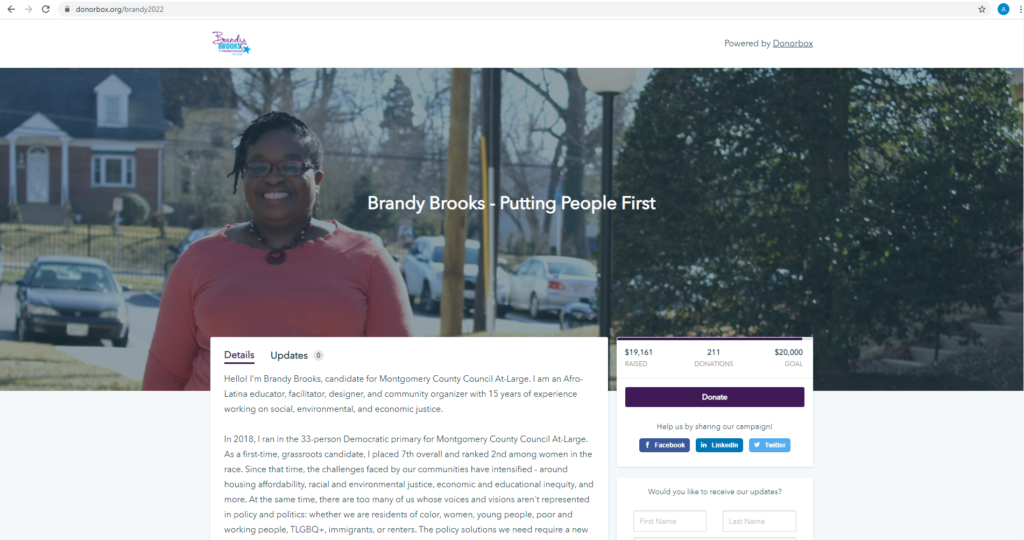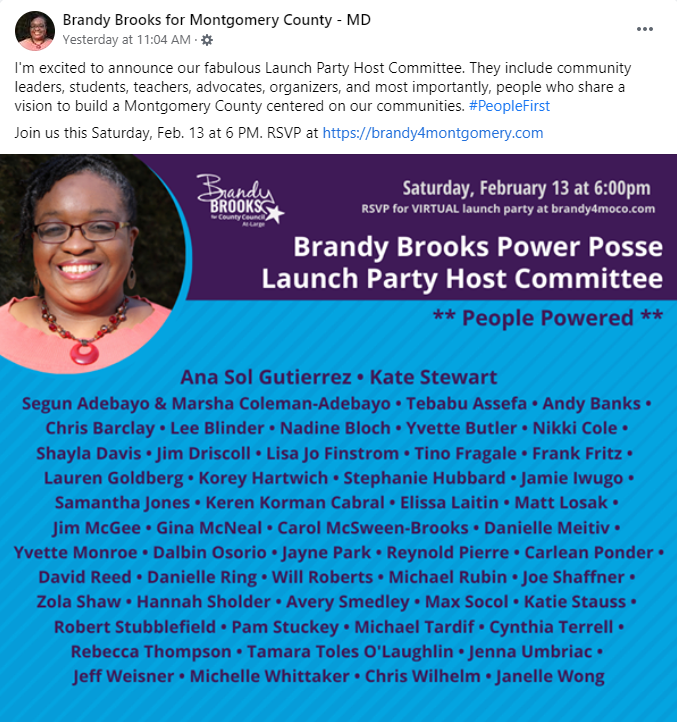By Adam Pagnucco.
Last weekend, returning county council candidate Brandy Brooks announced her new campaign for an at-large seat and she is out FAST from the gate. Why do I say that?
Because she is on an incredible pace to qualify for matching funds in the county’s public financing program.
MoCo candidates who opt into the county’s public financing program don’t get public matching funds right away. They need to meet a threshold of contributions from in-county residents which depends on the office for which they are running. According to Sec. 16-21 of the county code, council at-large candidates must collect at least 250 contributions from in-county residents totaling at least $20,000 before they are eligible to collect matching funds.
Now check this out. Brooks’s fundraising site went live on Saturday, February 6. Here is what it looks like as of 11:30 AM on Wednesday, February 10.

Yeah, you saw it: $19,161 from 211 donations. I hear a supermajority of those contributions have come from in-county residents. I’m sure we will hear more about that soon enough.
Now you might be tempted to say that $19,161 is not a lot of money. But this is public financing, in which public money amplifies individual contributions through matching funds. In MoCo’s system, for a council candidate, the maximum individual contribution allowed is $250. (It was $150 last time.) The first $50 is matched 4 to 1, the second $50 is matched 3 to 1 and the third $50 is matched 2 to 1. So a $250 contribution from an in-county resident is matched by $450 in public funds, thereby earning $700 for the receiving candidate.
In the prior cycle, candidates who qualified received an immediate large infusion of public funds after remitting their paperwork to the State Board of Elections. Initial distributions of matching funds totaled $86,136 for at-large incumbent Hans Riemer, $100,746 for Bill Conway, $73,814 for Hoan Dang, $116,061 for Evan Glass, $96,864 for Will Jawando and $88,979 for Gabe Albornoz. Other candidates who qualified received $70,000 or more in their first distribution with more public money coming in later.
Now here was the catch last time: it took a long time for candidates to reach their qualifying thresholds. Brooks, for example, received her first batch of public funds roughly eleven months after she established her account. In this cycle, she looks to be getting close to qualifying in LESS THAN A WEEK.
That’s bonkers, folks. Totally banana cakes!

Brooks is building a large team of progressives. This list is just going to grow.
So what does this mean? Brooks won’t get any public money right away. The county doesn’t start paying matching funds until a year before the primary, which occurs on June 28, 2022. So Brooks has to wait a while to get the big bucks. But when she does apply, she will probably get an infusion of at least $100,000 and she can apply for more matching funds as she gets more in-county contributions. The cap for matching funds receivable by council at-large candidates is $250,000 for the primary and another $250,000 for the general election. Even after a candidate hits the matching fund cap, that candidate can still collect as many individual contributions of up to $250 each as he or she can get.
Does this mean that Brooks is a shoo-in for election? Well, let’s consider the field in which she is running. Incumbent Hans Riemer can’t run again due to term limits, thereby creating one open seat. Incumbents Evan Glass and Gabe Albornoz used public financing last time and still have their donor lists. If they enroll in public financing again, they should have little problem raising money from their existing lists and qualifying for matching funds. Their status as incumbents should bring in new money too. Incumbent Will Jawando was the leading council fundraiser in public financing last time, but he has opted for the traditional system this time around. That said, Jawando has been a strong fundraiser in his prior campaigns, whatever the system, and there is little reason to believe that has changed now that he’s an incumbent.
So all of that probably places Brooks on a close-to-even financial footing with the incumbents. That’s a good thing for any challenger. And if any other candidates get into the at-large race and use public financing without prior experience in the system, they could take a while to get matching funds while Brooks and the incumbents are rolling in money. If you’re on Team Brandy, there is nothing but goodness in this scenario.
I said it once and I’ll say it again. Don’t underestimate Brandy Brooks.
*****
[An aside: to whichever county officials are responsible for this, you need to update your website materials and the online county code to reflect changes to public financing made by Bill 31-20. Otherwise you will have a helluva mess as candidates try to comply with the system believing that the old provisions still apply.]